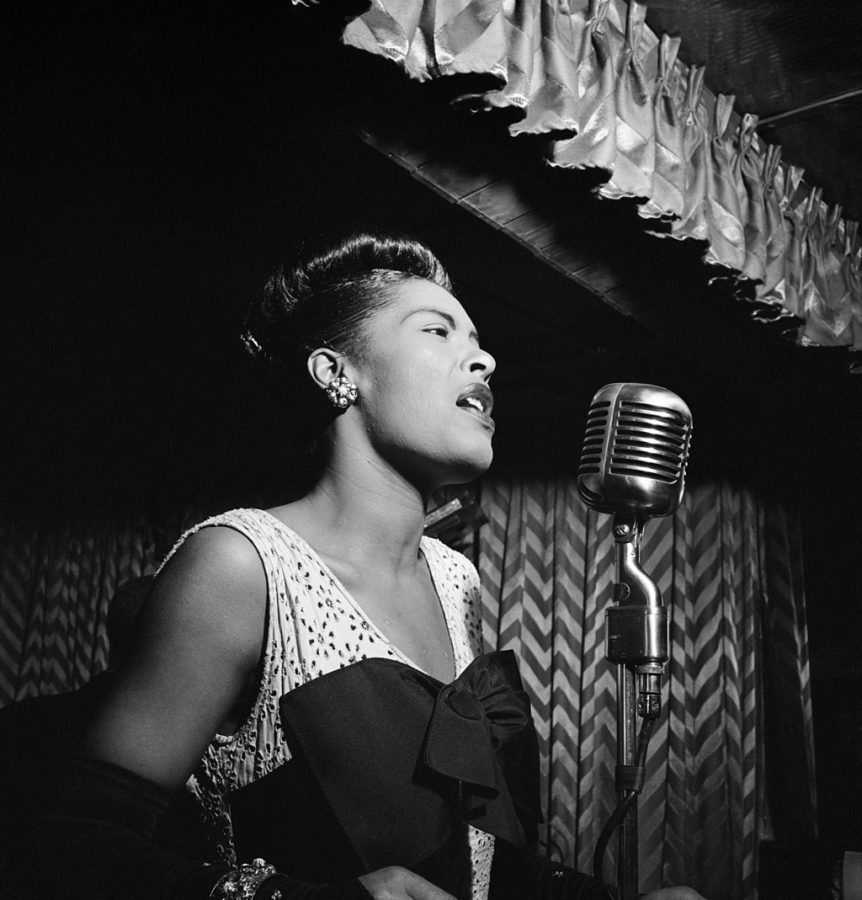“The United States vs. Billie Holliday” portrays a chilling narrative
William P. Gottlieb // commoms.wikimedia.org
“Southern trees bear a strange fruit. Blood on the leaves and blood at the root. Black bodies swinging in the southern breeze. Strange fruit hanging from the poplar trees.”
In the new film “The United States vs. Billie Holliday,” the title character, depicted by Andra Day, becomes a beacon of strength and resilience. Holiday’s song “Strange Fruit” and the controversy surrounding it was the focus of the movie, but the film also explored issues of trauma, mental health, drug addiction and racism during its retelling of the later years of Billie Holiday’s life and career.
I have heard the song “Strange Fruit” before, its lyrics retelling the horrors of the lynchings of African-Americans during the Jim Crow era. The dark, gritty nature of the song is reflected in the essence of the movie, as it does not shy away from hard truths and ugly realities. However, I was shocked to learn the controversy the song created—not just in the general public, but in the national government—and how the government then targeted Holiday for continuing to sing it.
Holiday’s song was controversial because it tampered with the precarious race relations in the North by exposing the volatile situation in the South.
“My song, Strange Fruit. It reminds them that they’re killing us,” Holiday said in tears.
Her understanding of the importance of her song encouraged her to stay strong and never stop singing it, despite the target it painted on her back.
The movie focuses heavily on mental health and unhealthy coping strategies. Holiday was raped at 10 years old, and grew up carrying that trauma with her. She self-medicated with heroin and cocaine to deal with the lingering pain, trauma and memories. Because mental health was not taken seriously at the time—and if it was, those resources would not be available to a woman of color—Holiday turned to narcotics to deal with her inner turmoil.
Every time Holiday tried to get clean, she was pulled back into the orbit of narcotics. With no help for her mental state, the government after her and high expectations from her fans, Holiday became a beacon of bad press as she could not shake her addiction to heroin. Unfortunately, Holiday’s addiction became the fuel the government needed to destroy her image and her career.
Harry Anslinger, FBI agent and commissioner of the narcotics unit, was one government agent in particular who had a vendetta against Billie Holiday.
“Drugs and n—–s are a contamination to our great American civilization,” Anslinger said to justify his hunt for African-Americans using narcotics.
When asked why he was targeting Billie Holiday specifically, Ansligner said, “(President Herbert) Hoover says (Strange Fruit) is un-American.”
In the movie, Anslinger was only one of the many men who were dead set on targeting, framing and villainizing Billie Holiday so that she would lose her following and stop singing her song.
The attitude of Anslinger and the rest of the FBI toward a woman simply trying to sing a song disgusted me. My disgust exponentially increased when they tried to use Holiday’s drug usage to put her behind bars when her only real crime was being an African- American woman speaking out against racism during the Jim Crow era.
The government’s targeting of Holiday landed her in prison for a year and a day on charges of possession of narcotics. Instead of charging her with inciting a riot, which is only a misdemeanor and a small fine, they wanted a charge that would result in jail time and the tarnishing of her image. During her trial, Holiday had assumed that she would be sentenced to rehab and some mandatory hospital time, but was blindsided when she was given a prison sentence.
As she was dragged from the courtroom, she wailed, “I need help, not jail time.”
Her unanswered cries reminded me of the current criminalization of people suffering from addictions. Instead of getting the help they need, they are often stereotyped as no-good gangsters who chose drugs and don’t deserve rehabilitation. Those perceptions about those struggling with addiction date back to the 1940s and make an imagined connection between the African-American community and unacceptable criminal behavior.
The movie was bookended with facts about anti-lynching bills that were introduced to Congress. The beginning of the movie noted that in 1937, a bill was introduced to ban the lynching of African-Americans, but it didn’t pass. The movie ended on the chilling note that in February of 2020, the Emmett Till Anti-Lynching Act was considered by the Senate, but it didn’t pass. Holiday’s story, her song “Strange Fruit” and the disappointment of the government to protect African-Americans from lynching shows us we still have a lot of work to do for civil rights in America.
As Holiday said to Anslinger: “Your grandkids will be singin’ Strange Fruit.” Holiday didn’t lie—I, for one, will be singing “Strange Fruit” until the day I die.











